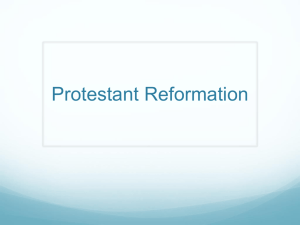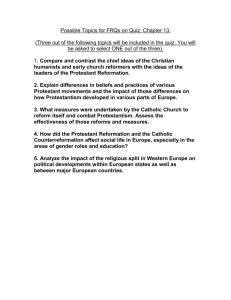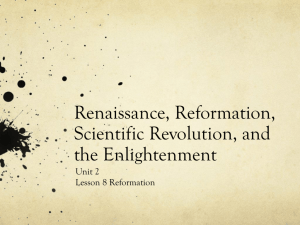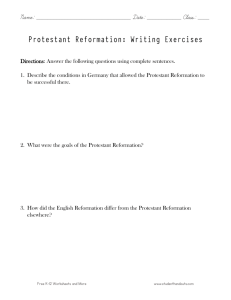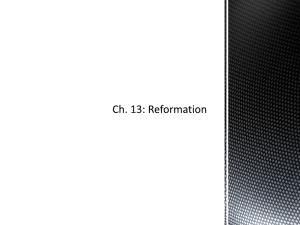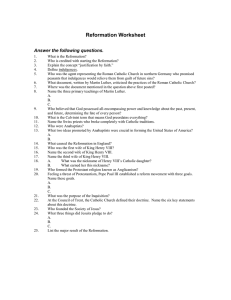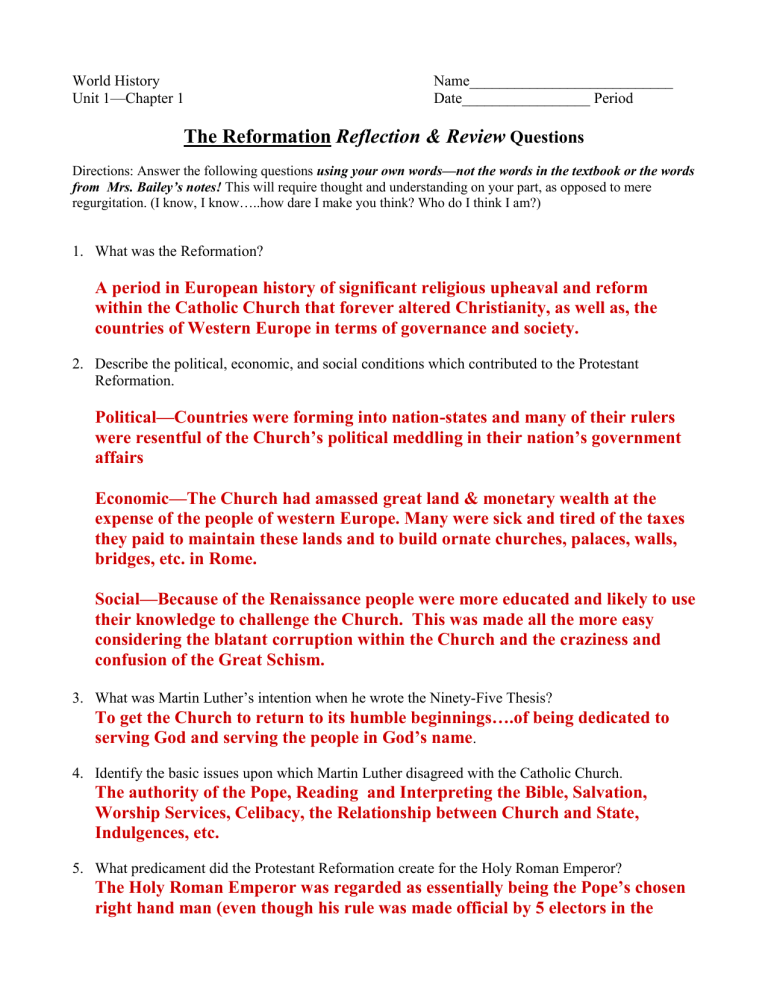
World History Unit 1—Chapter 1 Name___________________________ Date_________________ Period The Reformation Reflection & Review Questions Directions: Answer the following questions using your own words—not the words in the textbook or the words from Mrs. Bailey’s notes! This will require thought and understanding on your part, as opposed to mere regurgitation. (I know, I know…..how dare I make you think? Who do I think I am?) 1. What was the Reformation? A period in European history of significant religious upheaval and reform within the Catholic Church that forever altered Christianity, as well as, the countries of Western Europe in terms of governance and society. 2. Describe the political, economic, and social conditions which contributed to the Protestant Reformation. Political—Countries were forming into nation-states and many of their rulers were resentful of the Church’s political meddling in their nation’s government affairs Economic—The Church had amassed great land & monetary wealth at the expense of the people of western Europe. Many were sick and tired of the taxes they paid to maintain these lands and to build ornate churches, palaces, walls, bridges, etc. in Rome. Social—Because of the Renaissance people were more educated and likely to use their knowledge to challenge the Church. This was made all the more easy considering the blatant corruption within the Church and the craziness and confusion of the Great Schism. 3. What was Martin Luther’s intention when he wrote the Ninety-Five Thesis? To get the Church to return to its humble beginnings….of being dedicated to serving God and serving the people in God’s name. 4. Identify the basic issues upon which Martin Luther disagreed with the Catholic Church. The authority of the Pope, Reading and Interpreting the Bible, Salvation, Worship Services, Celibacy, the Relationship between Church and State, Indulgences, etc. 5. What predicament did the Protestant Reformation create for the Holy Roman Emperor? The Holy Roman Emperor was regarded as essentially being the Pope’s chosen right hand man (even though his rule was made official by 5 electors in the HRE). He was supposed to be a good Catholic who would ensure the Pope’s bidding throughout the HRE. Many German Princes were already resentful of his rule and questioned his legitimacy. Thus they were just looking for any reason to revolt. If he came down to hard on Protestants this would push them toward rebellion….if he didn’t come down hard enough he would be in hot water with the Pope. What’s a Holy Roman Emperor to do? 6. Compare & contrast Catholic and Protestant beliefs about: a. Role of Clergy C = Necessary to lead people to salvation P = Not necessary…believed people could find salvation themselves b. True Sources of Religious Authority C = True sources are the Pope, The Church, the Bible and in that order P = One true source of authority is the BIBLE c. Relationship b/w church and secular authority C = Placed the Church above civil government/secular authorities P = Placed religious institutions/organizations under the authority of civil government 7. Explain how the Reformation encouraged revolts among peasants throughout Europe. Silly Peasants took Luther’s ideas to heart about not only challenging authority but also about individual rights/freedoms... and used that to justify revolting against political authority and oppression. 8. Describe why and how other Protestant churches/denominations were established in Switzerland and elsewhere in the Holy Roman Empire. Lutheranism paved the way for others to establish additional Protestant churches that were even more reform minded in their theological beliefs and practices. More often than not, official recognition of these churches came about after years of war and religious conflict/persecution. 9. Explain why the Anabaptists were considered to be dangerous radicals. Anabaptists refused to swear loyalty to or participate in any institution of government. Moreover, they believed in establishing their own separatist’s communities that were “of this world but not in this world”. This was just a little too out there for a lot of people…be they Catholic or Protestant. 10. Explain why Henry VIII established the Anglican Church as the Church of England. Henry VIII established the Anglican Church in an attempt to secure the legitimate right of his unborn child to inherit the throne and ensure the Tudor line of succession. Unfortunately, his efforts were for naught as the child was a girl, instead of a boy. Explain the impact that Henry VIII’s actions had on England in the second half of the 1500s and for hundreds of years thereafter. His actions left a legacy of political and religious upheaval in England that was marked by a great deal of war and suffering by the people. 11. What was the Catholic Reformation? An internal movement within the Church to institute reforms….in large part to counter the success of Protestantism. 12. What actions did the Church take in its’ Counter Reformation efforts? First and foremost, called for a meeting of leading clergy to discuss the validity of criticisms, to enact reforms, and determine Church dogma. The council of leading clergy members also published the Index and established the Inquisition as a means of dealing with heretics. Additionally, the Church began to recognize and encourage new religious orders or societies of men and women devoted to serving the Church in a unique way. 13. What was decided by the Council of Trent? It was decided that some changes needed to be made in regards to the clergy, but NO CHANGES were to be made in regards to Church Dogma. It was also decided that the Church needed to take a harder line towards preventing and punishing heresy. 14. Explain why the Jesuits were so successful in helping to stop the Protestant tide rolling throughout Europe. By and large the Jesuits were a proactive global force for good in regards to Catholicism…they helped kill Protestantism in many European countries with their kindness, their energy, and their whole hearted devotion. 15. List three effects brought about in total or in part by the Protestant Reformation. 16. Define: a. Simony The practice of selling powerful and prestigious Church offices to the highest bidder for their personal gain b. Indulgence That which is bought to release all or part of one’s punishment and time in purgatory c. Purgatory Waiting area between heaven and hell d. Sacrament According to the Church, one of a series of religious rituals necessary to achieve salvation e. Excommunication To be formally expelled from the Church and forevermore denied the sacraments thereafter. f. Heretic/heresy One who contradicts established church dogma or a belief/idea that contradicts official church teachings g. Sect A large group or a particular section within an established whole h. Denomination Smaller divisions or groups within a sect i. Predestination The Calvinist idea that God had long ago determined everyone who will be saved and who will be condemned. j. The Elect Those who were predestined by God for salvation according to Calvinism k. Huguenots French followers of Calvin who were persecuted because they were not on board with the official state religion of France—Catholicism. l. Puritan Followers of Calvin who were religious dissenters in England because they wanted to see the Anglican Church purified of its’ many Catholic rituals and traditions. m. The Index A list of books that the Council of Trent determined were illegal for Catholics to possess, read, or sell. n. The Inquisition A Catholic Court established by the Council of Trent to try and punish heretics. 17. Identify: a. John Wycliffe English predecessor of Luther who first criticized the questioned the Church for its activities First to translate the Bible into English Declared a heretic after his death Followers were known as Lollards b. John Huss Early Czech reformer who was inspired by Wycliffe Burned at the stake as a heretic Followers were known as Hussites c. Martin Luther German monk who wrote the 95 Thesis Started the Protestant Reformation d. Diet of Worms Meeting called by the Holy Roman Emperor to give Luther a chance to save both his mortal and physical soul e. Ulrich Zwingli Swiss Priest who launched his own reform movement Not a friend of Luther Actions lead to the development of many new denominations within the Protestant sect f. John Calvin French reformer who was inspired by Zwingli Advocated a more serious and stern church Predestination and The Elect g. Peace of Augsburg The agreement which helped end years of religious warfare in the HRE by determining each Prince could determine their lands official religion h. Conrad Grebel Fundamentalist Swiss reformer whose religious ideas regarding baptism, pacifism, and social separation were persecuted for being radical i. Henry VIII King of England who for political reasons broke with the Catholic Church and established himself as the head of the Anglican Church which he also made the official church of England. Six wives j. Reformation Parliament The Parliament which worked to make England a Protestant nation not just in word, but also in deed. k. Edward VII Henry VIII’s only son whose time on the throne was short-lived l. Bloody Mary Henry VIII’s eldest daughter by Catherine of Aragon Came to throne upon Edward VII’s death as a woman scorned Persecuted thousands of Protestants in an effort to restore England to Catholicism m. Elizabeth I Henry VIII’s younger daughter by Anne Boleyn Came to the throne upon Mary’s death Restored England to Anglicanism but encouraged religious toleration Tried to make both Anglicans and Catholics happy and in doing so ticked off the Puritans n. Ignatius of Loyala Founder of the Jesuits Wrote “Spiritual Exercises” o. Law of War and Peace Written by Hugo Grotius Inspired by the conduct of European nations in fighting wars in the name of religion Established many of the modern rules regarding war
